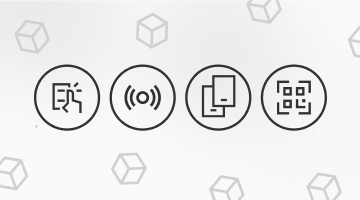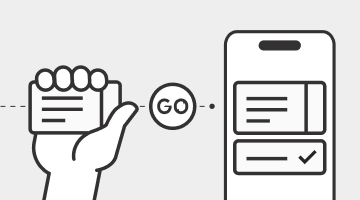What is interoperability and why do we need it?
As more and more of our identity credentials start to become digitised – driver's licences; training and education certificates; visas; banking cards; medical cards; employee IDs; birth, civil union or marriage certificates; memberships, and even things like proof of insurance – we will need somewhere to put them.
Enter, the digital wallet.
If you need a primer, read about what a digital wallet is and how it fits into our worlds with our digital wallets 101 article.
In our daily lives, when these documents are in a physical form, we can exercise choice about where we keep them. We don’t have to ask anyone’s permission to take them out of our back pockets and put them into a wallet. And, if we decide to change our wallet, or even spread our life credentials across more than one, we can.
When we start to store credentials in digital wallets there are a lot more considerations. Imagine a world where every credential we have needs to be held in a different app provided to us by the issuer of the credential. Who wants that many apps on their phone?
In order for our digital wallets to enable us to hold multiple documents from multiple sources, it needs to be interoperable. Let’s discuss what interoperability is and why it’s so important when it comes to digitising and holding our identity credentials.
Many credentials, one wallet
Many of us will want to store credentials from lots of different issuers in the same wallet. Some of us might want or need to hold different types of credentials in different types of wallets: for example one for work and one for personal.
In some cases, the organisations that provide us with credentials will have rules around the types of wallets they can be used in. In other cases, we will be able to choose for ourselves.
Whatever the circumstances, our digital credentials are only as useful as our ability to do something with them. Most of the time, we want to use them to prove our entitlement to do something. We might need to prove our ability to drive, entitlement to a free prescription or qualification to do something. We may want to simply prove our age or relationship to someone in our family.
There are many different considerations when thinking about digital wallets. How digital wallets support our security and privacy are obvious considerations. Less obvious – but just as important – is the topic of interoperability, or interop for short. At MATTR we think interop is really important. It helps us to ensure we don’t become too dependent on any one party or vendor, so we don’t have to keep all our eggs in one basket.
What is interoperability?
Interoperability means that a software or application can work with multiple underlying technologies. It’s both undesirable and unrealistic for everyone to use exactly the same applications and software for verifiable credentials (unless you are a power hungry monopolist out to dominate to world).
Interoperability is important for many parts of the web to work well – it's what allows open communications among devices. When it comes to digital wallets, it is important because different organisations are likely to use different technologies to:
- issue a credential
- hold and store a credential (or set of credentials) in a wallet
- ask a wallet holder to share a credential
- verify that credential when it is shared
Why do we need an interoperable digital wallet?
Let’s imagine that we have a bunch of credentials that prove we have the qualifications to do a particular type of work, and we want to keep them in one place. Imagine that we want to keep a record of all the credits and certificates we have earned over our lives and be able to use them in employment applications or to sign up for further education for which they are a prerequisite.
Imagine all the online forms we could fill in automatically using our digital wallet and how much faster it could be to validate the qualifications or employment details. That sounds much more convenient than trying to dig out old paperwork from a shoebox in the cupboard.
These credentials might come from different institutions, across countries, sectors and employers. For us to be able to gather all this documentation into our digital wallet, we would need lots of different organisations to be able to issue credentials into the wallet we want to use.
The wallet you use to hold these credentials will need to be capable of interacting with and receiving them from these different issuers who might all be using different software and applications to issue them.
When you need to present and share the information stored in those credentials with someone who wants to ensure they are valid, the verifier needs to be able to ask you for the information using their own systems, which could be different again!
Imagine then, you decide to change your wallet. That you don’t want to use the wallet you are currently using and you want to move all of your credentials from one wallet to another one. In the physical world that is simple. In the digital world, not so much so.
Sounds complicated, right? That’s because it is! And that is where the importance of interop comes in.
Towards interoperability for all
The good news is, there are a lot of committed people working together to give us a future full of freedom, choice and convenience with interoperability. Who wouldn’t want to live in that world? These people work together to create common standards that issuers, wallet application providers and verifiers can use to make sure that everything can work together seamlessly.
We’re now starting to see the seeds of this new world emerging, and MATTR participates in a number of inter-company working groups that are working towards interoperability for the next generation of digital wallets. One great example is the recent Jobs for the Future (JFF) Plugfest, where different organisations have come together to prove that their applications are interoperable and built on common internet standards.
Watch our recent JFF Plugfest video demo, which shows how the MATTR Wallet works interoperably with multiple identity providers and issuers.
Whilst interoperability involves technical standards and sounds very complicated, when it is achieved, it is all about making life easier for people and ensuring we have viable choices in the future. This is why MATTR is a standards-first organisation, committed to interoperability to create a new type of freedom through digital trust and why the MATTR Wallet is built on that commitment.
If you want to learn more about other considerations when designing digital wallet solutions, read our article about implementing wallets in the wild.
Contact us if your organisation needs help to work out how to issue or verify credentials to employees, customers or other stakeholders, or if you want some help to design a future-focused wallet strategy of your own.







